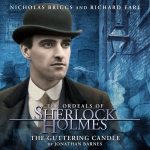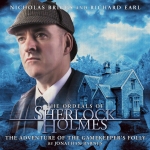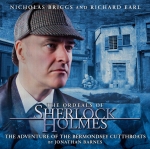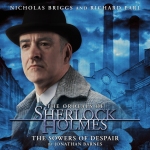Four interlinked cases from the four decades of Sherlock Holmes’ long career…
One of the delights of dealing with a property such as Sherlock Holmes – compared with Doctor Whoor Blake’s 7 – must be the freedom to tell the stories you wish to tell, unhampered by constraints of licensors’ diktats (or “whims”, depending on who you listen to). As long as new stories respect what’s been set up by Sir Arthur Conan Doyle, then they can pretty much go anywhere – as Big Finish’s series has already proved.
 The Ordeals of Sherlock Holmes (and its companion piece The Adventure of the Perfidious Mariner) experiments with the formula of the Holmes story. The Guttering Candle, the first tale, is set before Holmes and Watson meet, so of necessity can’t use the standard format: it chronicles Holmes’ first meeting with Inspector Lestrade with those bits related as ordinary drama, while Watson is kidnapped while serving in Afghanistan, and records the story in his journal. This way, Jonathan Barnes shows us how much the pairing of the two men altered both of them, sometimes in less than obvious ways. Listen to this one very carefully!
The Ordeals of Sherlock Holmes (and its companion piece The Adventure of the Perfidious Mariner) experiments with the formula of the Holmes story. The Guttering Candle, the first tale, is set before Holmes and Watson meet, so of necessity can’t use the standard format: it chronicles Holmes’ first meeting with Inspector Lestrade with those bits related as ordinary drama, while Watson is kidnapped while serving in Afghanistan, and records the story in his journal. This way, Jonathan Barnes shows us how much the pairing of the two men altered both of them, sometimes in less than obvious ways. Listen to this one very carefully! The Adventure of the Gamekeeper’s Folly is taken from the period when Holmes is apparently at the height of his powers, convinced of his own abilities, and prone to condescension. Barnes’ script addresses some of the complaints that have been levelled at the character over the years, and forces him to deal with the aftermath of his actions – and note the way in which Watson reacts to both Holmes’ original actions and their consequences. Watson is not an easy role to play, particularly when – as here – he is depicted in the way Doyle wrote him, rather than the “buffoon” of the Basil Rathbone era, and Richard Earl captures that blend of honesty, loyalty and deep affection which should characterise the doctor.
The Adventure of the Gamekeeper’s Folly is taken from the period when Holmes is apparently at the height of his powers, convinced of his own abilities, and prone to condescension. Barnes’ script addresses some of the complaints that have been levelled at the character over the years, and forces him to deal with the aftermath of his actions – and note the way in which Watson reacts to both Holmes’ original actions and their consequences. Watson is not an easy role to play, particularly when – as here – he is depicted in the way Doyle wrote him, rather than the “buffoon” of the Basil Rathbone era, and Richard Earl captures that blend of honesty, loyalty and deep affection which should characterise the doctor. We jump to the start of the twentieth century for The Adventure of the Bermondsey Cutthroats, and one of the most disturbing sequences that Big Finish has put on audio – the pre-credits scene rivals the psychological terrors of the best serial killer stories, and the rest of the story maintains the level. This story provides an explanation for Holmes’ retirement from the profession, and also the fates of some of the supporting characters. Barnes is unafraid to show the detective not operating at his best, and in so doing explains why some of the contemporary updatings of the character over the years haven’t worked (the taunts from the villain about the telephone, for example).
We jump to the start of the twentieth century for The Adventure of the Bermondsey Cutthroats, and one of the most disturbing sequences that Big Finish has put on audio – the pre-credits scene rivals the psychological terrors of the best serial killer stories, and the rest of the story maintains the level. This story provides an explanation for Holmes’ retirement from the profession, and also the fates of some of the supporting characters. Barnes is unafraid to show the detective not operating at his best, and in so doing explains why some of the contemporary updatings of the character over the years haven’t worked (the taunts from the villain about the telephone, for example). The set concludes with The Sowers of Despair, which ties together threads from the previous three stories. It’s narrated by Holmes himself, for reasons which he explains quickly, and although you start to wonder if Barnes is paying tribute to Agatha Christie’s Curtain, it goes in a very different direction. Those unfamiliar with The Adventure of the Perfidious Mariner are advised to listen to that before The Sowers, partly because it explains Holmes and Watson’s reunion following the events of The Bermondsey Cutthroats. To say too much more would spoil some great surprises.
The set concludes with The Sowers of Despair, which ties together threads from the previous three stories. It’s narrated by Holmes himself, for reasons which he explains quickly, and although you start to wonder if Barnes is paying tribute to Agatha Christie’s Curtain, it goes in a very different direction. Those unfamiliar with The Adventure of the Perfidious Mariner are advised to listen to that before The Sowers, partly because it explains Holmes and Watson’s reunion following the events of The Bermondsey Cutthroats. To say too much more would spoil some great surprises.
The undoubted star of the set, though, is Briggs as Holmes, who moves from the brash young man of The Guttering Candle through the superbly confident consulting detective, to a man faced with the harsh consequences of his own actions – and finally to someone who, despite everything, still finds it hard to empathise properly with the rest of humanity (his diary entry about the discussions in the Watson household when he visits is ample proof of this), but is almost desperately needy for the company of his oldest friend. When you hear his explosion of “Enough!” in the third story (which I listened to shortly after hearing Briggs explaining that “The Doctor is regenerating” in his persona as the Voice of the Daleks™) you don’t need any visuals to know exactly how Holmes looks, and there are many other examples.
Ken Bentley maintains the pace throughout the stories, allowing them to breathe where they need to – contrast the account of the train journey to Norfolk with the dash to Bermondsey to prevent a tragedy – and has assembled a strong cast of actors who, where necessary, can age their voices as required by the scripts.
Verdict: A contrasting set of cases which will reward a second listen once the links have become clear, with Briggs and Earl now a definitive audio Holmes and Watson. 9/10
Paul Simpson
No comments:
Post a Comment